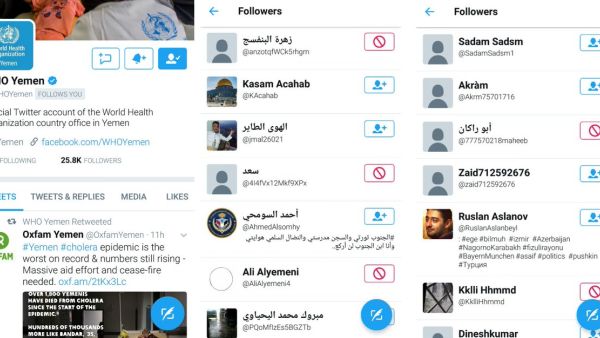- Fake Twitter accounts are targeting individuals reporting from Yemen
- The intention seems to be the delegitimization of the accounts
- Saudi Arabia and its allies have been accused of being behind the bots by some
- This is not the first time Saudi-linked fake accounts have been used for political purposes
by Rosie Alfatlawi
As the revelations about Russia’s use of fake accounts to influence U.S. and European politics continue, the Middle East is also being hit by the phenomenon.
Yemen-focused Journalist Iona Craig has alleged that thousands of bots have followed her on Twitter in recent weeks.
This is something the Yemen Twitterati have been facing since May. But in the last two weeks the bots/fake accounts following me have reached ridiculous proportions. I've blocked nearly 9,000 so far. This is just from the last few hours. pic.twitter.com/1cCbMxLVYG
— Iona Craigأيونا كريچ (@ionacraig) November 21, 2017
The situation, which has been afflicting the Yemen Twitterati since May, has “reached ridiculous proportions,” she said.
While Craig gave no suggestion as to who the culprit is, Saudi Arabia and the U.A.E. have been accused by some of being behind the fake accounts, which are apparently intended to force her suspension.
Ksa. They would first delete our tweets. Now they send bots. If you have many bots following you, twitter suspects your account & you suffer repurcusions.
— FreeHishamOmeisy (@centuro33) November 22, 2017
The British-Irish journalist has criticized the humanitarian impact of the Saudi-led coalition’s campaign against Iran-backed Houthi rebels in Yemen.
Must be these guys pic.twitter.com/2ovPGUTrIl
— Just Another Egg (@feggnews) November 21, 2017
Craig is not alone. Other journalists, researchers and humanitarian workers in the war-torn Arab country have complained of fake accounts following them in huge numbers in recent months.
In July, Craig’s close friend and Sana’a-based political and information analyst Hisham al-Omeisy, tweeted that the same fake accounts were following different NGO workers in Yemen.
Got tip that iNGOs working in #Yemen having same problem of surge in fake followers. Checked their followers, found accts I already blocked! pic.twitter.com/EW0MMoO6vl
— Hisham Al-Omeisy (@omeisy) July 21, 2017
In a blog post in July, he wrote that after a spike in his Twitter followers he had “suspected something was amiss,” given that most of the handles were in Arabic, and he tweets in English.
Like Craig, he had been spammed by bots in their thousands.
“Fake followers can hurt your account’s credibility, engagement rate,” he explained. “And in extreme cases lead to suspension of account on premise of violating Twitter’s rules (i.e. where you would be suspected of buying followers).”
However, al-Omeisy did not offer a suggestion as to who could be behind what he argued was a “coordinated action targeting Yemen Twitterati,” other than that he suspected “involvement of state level entities.”
Described as the “most famous Yemeni in the Western world,” in part thanks to his considerable Twitter following, al-Omeisy was kidnapped in August. He is reportedly being held by the Houthi-controlled National Security Bureau over his interviews in the Western media about the crisis in Yemen.
"Hisham has been a really crucial voice to Yemenis on all sides of the conflict," Craig said of al-Omeisy, who has been critical of both warring parties.
- Are Saudi Bots Behind the Hashtag 'Lebanese Against Hezbollah'?
- Why is the World Suddenly Paying Attention to Yemen?
Rasha Jarhum, founder of the “Peace Track” initiative in southern Yemen, was also targeted.
Yemeni activists have been targeted by fake follower bots. I have over 200 per day following me. @thatisabot happy to share my blocked list. pic.twitter.com/wzG0I1J9ZT
— Rasha Jarhum رشا (@RashaJarhum) July 18, 2017
Like al-Omeisy, Jarhum has widely reported on the humanitarian situation in Yemen but does not single out the Saudi-led coalition in particular.
With little concrete evidence, finger-pointing at Saudi Arabia and its allies is conjecture. Still, it seems clear that whatever organization or individual is behind the fake accounts wants to make reporting about Yemeni suffering more difficult.
In July Exeter University lecturer Marc Owen Jones identified a separate but connected issue. He wrote on his blog that automated bots had been “using the ‘Yemen’ hashtag to promote the idea of Iranian influence in Yemen, a common trope in Gulf politics."
Jones identified hundreds of “bot accounts” spreading anti-Iran messages on that tag, speculating that there may be a link to satellite channel Saudi24, which is “loosely aligned with state rhetoric.”
More recently, he identified a more certain link between Saudi-created fake accounts and a tweet by U.S. President Donald Trump. On Nov., Trump tweeted “I have great confidence in King Salman and the Crown Prince of Saudi Arabia, they know exactly what they are doing…”
In Graphs, How Pro Saudi Twitter Bots Boost Trumps Ego (and his retweet count). I have compiled a bewildering, uncensored & illicit array of graphs to show how @realDonaldTrump 's pro-King Salman tweet was amplified by bots. https://t.co/RS7jDxKquK #Bots #SaudiArabia pic.twitter.com/lI46voZEeO
— Marc Owen Jones (@marcowenjones) November 13, 2017
It has so far been retweeted 98,494 times, considerably more than the 17,000 average for Trump. Jones found that thousands of the retweets come from Riyadh-based accounts, with large numbers of those having been created on the same day and tweeting similar or identical content.
In fact, accusations that Saudi-linked fake accounts have been involved in, among other things, promoting sectarianism and burying criticism of Saudi foreign policy go back months.







